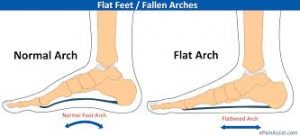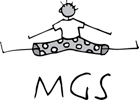Written by Brian Payne
Unfortunately lately I have witnessed the result of people with either flat or flatter feet, purchasing on-line, an irresistible offer for running/training shoes. This has been unfortunate for them as the shoe has lead to an injury around the lower leg and /or foot region.
If you walk barefooted across a flat stretch of sand and turnaround and can see most of your feet prints imprinted into the sand this would indicate that you have flat/flatter feet. Alternatively look into a mirror barefooted and watch what happens to the long arch on the inside as you step and transfer the weight from the heel to mid-foot and onto the toes. Once again if you notice this inside long arch is very close to the ground you have flatter/flat feet.
This foot posture has consequences for your lower leg muscles and the way they work when you exercise. To be able to run you should have the strength to do around 35 heel raises on each leg. If you have flatter/flat feet this ability is lost because of the unique way in which muscles work. Muscles prefer to operate in mid-positions, where they are able to contract better and produce a muscular torque (engineers call torques moments). Generation of these muscular torques during either the gait and/or running cycle helps control the foot posture.
Now if your calf is strong enough, which is rare if you sit at a desk, you may not require a lot of support to that long arch on the inside of the foot via your running shoe. Most people need some arch support of varying degrees, which is dependent on many things taking place in the lower limb with the type of sport or activity being performed. Some people use orthotics when they run and gain support from the orthotic hence do not require much arch support from the shoe.
 Overall caution needs to be exercised before purchasing a great on-line deal! Hopefully factoring in some of these things mentioned above will help your next purchase on-line be more informed-especially if you have flatter feet! . Ask your Physiotherapist for their advice on your foot type, and then ask the professionals in the Running shoe shops, they will know which shoe should match your foot type best. Don’t make the fatal mistake we see all the time and buy because you like the colour or swag brand of the moment.
Overall caution needs to be exercised before purchasing a great on-line deal! Hopefully factoring in some of these things mentioned above will help your next purchase on-line be more informed-especially if you have flatter feet! . Ask your Physiotherapist for their advice on your foot type, and then ask the professionals in the Running shoe shops, they will know which shoe should match your foot type best. Don’t make the fatal mistake we see all the time and buy because you like the colour or swag brand of the moment.
